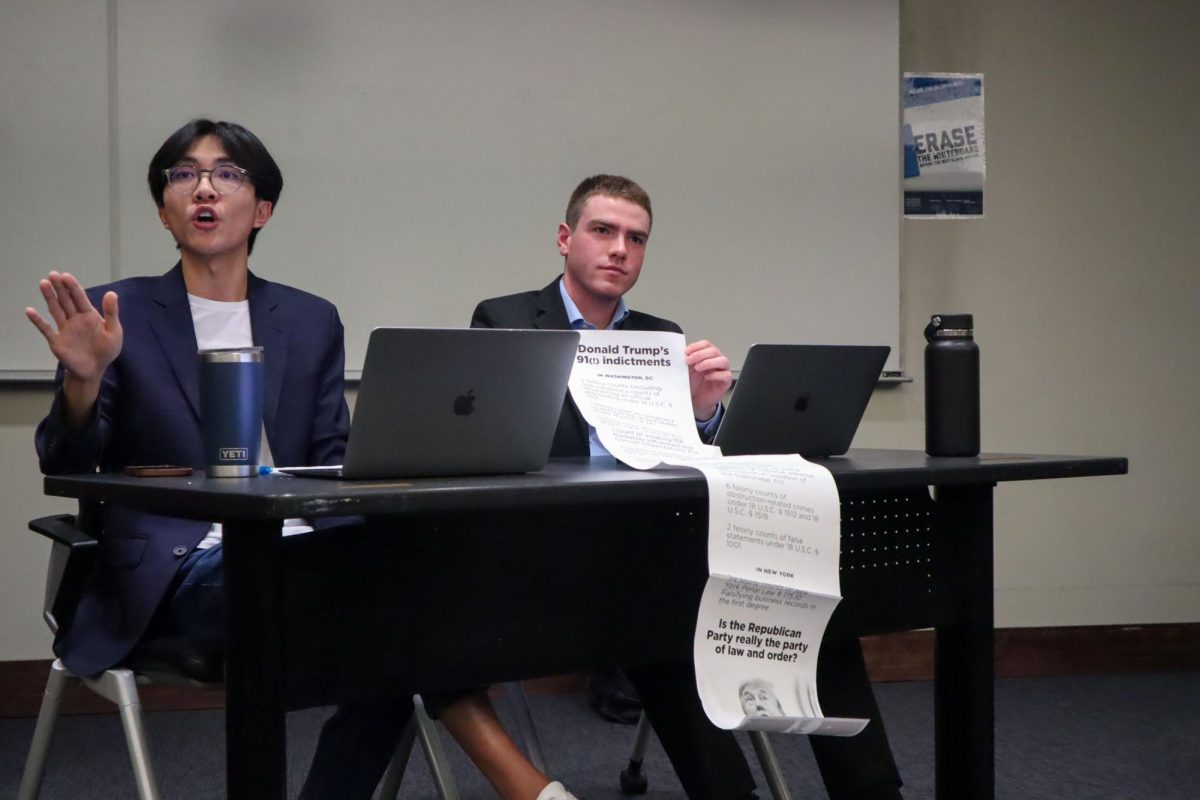Members of GW College Democrats and GW College Republicans went head to head over education, corruption in government, crime and international conflicts during their annual debate in the School of Media & Public Affairs on Monday.
College Democrats Executive Vice President Emmanuel Ching and Student Association Sen. Ethan Fitzgerald (CCAS-U) debated against College Republicans first-year representative Kieran Laffey and Director of Political Affairs Jack Fisher. The debate was moderated by Sarah Freeman, the President of College Democrats, and Aedan Yohannan, the chairman of the College Republicans.
The debate opened with a discussion of congressional funding and politics.
Ching said Social Security, health care and Medicaid are the programs most deserving of congressional support and funding. He attributed the looming threat of a government shutdown to an increasingly divided Republican Party.
“Democrats and, like you say, Republicans want to keep the government open,” Ching said. “But your conference is so dysfunctional. You sold yourself to the far right to the point that you can’t even get that done.”
Ching said far-right Republicans like Reps. Lauren Boebert (R-CO) and Matt Gaetz (R-FL) now control the party, evidenced by Gaetz’s successful motion to vacate Kevin McCarthy (R-CA) as Speaker of the House early last month.
Laffey said “Bidenomics” have failed because inflation remains an issue among voters and the cost of living is increasing.
“Costs are up, people are living paycheck to paycheck,” Laffey said. “We’re college students. We’re going to come out of this with less money in our pockets, paying for higher costs.”
The debaters then turned discussion to the U.S.’s role in ongoing conflicts abroad.
Fitzgerald said providing aid to Ukraine is essential to the future of American foreign policy to deter aggression by the U.S.’s other adversaries like China.
“If we didn’t stand up for Ukraine against Russia, that would have sent a clear signal to China that they could just go into Taiwan,” Fitzgerald said. “When we’re talking about our foreign policy approach, we need to be cognizant of these realities that are going on.”
Fisher called the state of Israel a “great actor” and said the Israeli government is attempting to avoid civilian casualties in the Gaza Strip by dropping “knock bombs” — nonexplosive munitions dropped on roofs before larger strikes — and by alerting people in targeted areas before bombing. Fisher said some members of the Democratic party are “Hamas supporters” and antisemitic.
“They don’t call it terrorism, they call it resistance,” Fisher said. “That’s the whole problem. They dress their antisemitism up in corporate lingo like ‘colonizers,’ ‘occupiers’ and ‘settlers,’ and they phrase it that way because you can’t sell antisemitism as just antisemitism.”
Ching said no one in the Democratic Party “is praising Hamas,” and that those who do don’t represent the values of the Democratic Party.
“If you stand for peace, you should be able to condemn Hamas,” Ching said. “More than that, we should just be standing with our allies, but we also stand for human rights. And our strategy should be ensuring that we are advancing and promoting human rights across the globe.”
Moderators asked how members of Congress should respond to violations of government ethics by members of their own party, highlighting Sen. Bob Menendez’s (D-NJ) recent bribery and foreign agent charges and Rep. George Santos’ recent fraud charges.
Ching unfurled a piece of paper listing all 91 of former President Donald Trump’s federal and state charges across four criminal cases, the paper stretching from his desk to the floor. He said Republicans’ refusal to hold Trump accountable for these charges is “ridiculous.”
“It is deeply hypocritical that Republicans can come in here trying to lecture anybody about law and order when their own party leader is accused of 91 crimes,” Ching said. “If you believe in trickle-down economics, believe in trickle-down accountability, start at the top.”
Fisher said Republicans are focused on reducing crime, citing Trump’s proposal to involuntarily confine mentally ill people who may commit acts of violence and increasing funding for security in schools. He said increasing rates of robbery, sexual assault and homicide in D.C. in the last year show Democrats’ mishandling of crime.
“This is on our doorstep,” Fisher said. “We’re seeing it, and soft-on-crime policies do not work.”
The debaters then discussed LGBTQ+ curriculum in schools.
Ching said Florida Gov. Ron DeSantis (R) is using the 2022 Parental Rights in Education Act — commonly referred to as the “Don’t Say Gay” law, which bans the discussion and instruction of sexual orientation or gender identity in kindergarten through third grade — as a distraction from “real issues.” Ching said education on LGBTQ+ issues from a young age helped him when he was closeted and taught him that his identity is not “a mistake.”
“If you want to talk about education, let’s talk about funding our schools and raising teacher pay,” Ching said. “But you don’t want to because you can’t win on those issues.”
Fisher said educators shouldn’t teach LGBTQ+ content to young children because they are too young to understand them.
“Sexuality and gender identity, transgenderism, they’re all being taught in K through fifth grade,” Fisher said. “That’s a legitimate issue. Kids can’t even spell transgenderism, they shouldn’t be learning about it.”
The debate concluded with debaters sharing their favorite picks of the moniker options officials selected earlier this year. Laffey said the University officials’ choice of “Revolutionaries” as the GW’s moniker last May was “not an issue” despite people who complained about the choice. Fitzgerald said he likes the new moniker.
“I’m not going to make some political statement about it, but I really liked ‘Revolutionaries,’” Fitzgerald said. “I’m revved up for it.”





